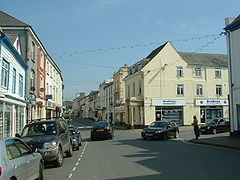Callington, Cornwall
Callington
|
|
|---|---|
 Fore Street, Callington's main street |
|
| Callington shown within Cornwall | |
| Population | 5,786 (Census 2011) |
| OS grid reference | SX359696 |
| Civil parish |
|
| Unitary authority | |
| Ceremonial county | |
| Region | |
| Country | England |
| Sovereign state | United Kingdom |
| Post town | CALLINGTON |
| Postcode district | PL17 |
| Dialling code | 01579 |
| Police | Devon and Cornwall |
| Fire | Cornwall |
| Ambulance | South Western |
| EU Parliament | South West England |
| UK Parliament | |
Callington (Cornish: Kelliwik) is a civil parish and town in southeast Cornwall, England, United Kingdom about 7 miles (11 km) north of Saltash and 9 miles (14 km) south of Launceston.
Callington parish had a population of 4,783 in 2001, according to the 2001 census. This had increased slightly to 5,786 in the 2011 census.
The town is situated in east Cornwall between Dartmoor to the east and Bodmin Moor to the west. A former agricultural market town, it lies at the intersection of the south-north A388 Saltash to Launceston road and the east-west A390 to Liskeard road.
Kit Hill is a mile northeast of the town and rises to 333 metres (1,093 ft) with views of Dartmoor, Bodmin Moor and the River Tamar.
The hamlets of Bowling Green, Kelly Bray, Frogwell and Downgate are in the parish.
Callington railway station was the terminus of a branch line from Bere Alston, the junction with the Southern Railway's Tavistock to Plymouth line. The railway line beyond Gunnislake to the Callington terminus was closed in the 1960s, due to low usage and difficult operating conditions on the final sections of the line due to several severe gradients and speed restrictions. One can still travel by rail on the Tamar Valley Line from Plymouth as far as Gunnislake via Bere Alston, where trains reverse. For most of its journey the line follows the River Tamar. The nearest railway station to Callington is at Saltash.
Food manufacturers Ginsters and Tamar Foods (both wholly owned subsidiaries of Samworth Brothers) are the largest employers in the town and employ hundreds of locals as well as many immigrants who have arrived as a consequence of the recent accession to the EU of a number of Eastern European countries.
...
Wikipedia

